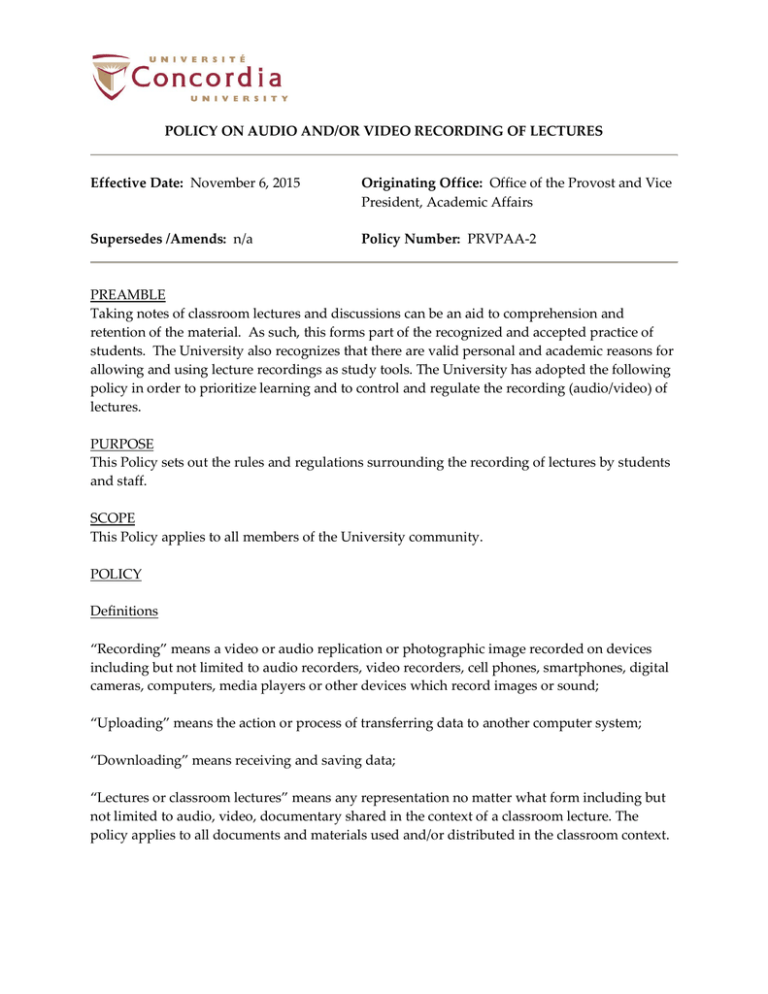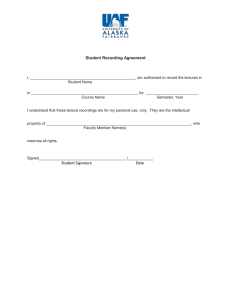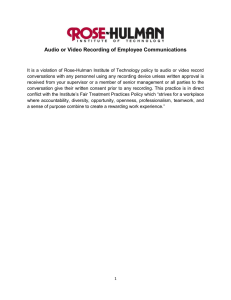POLICY ON AUDIO AND/OR VIDEO RECORDING OF LECTURES
advertisement

POLICY ON AUDIO AND/OR VIDEO RECORDING OF LECTURES Effective Date: November 6, 2015 Originating Office: Office of the Provost and Vice President, Academic Affairs Supersedes /Amends: n/a Policy Number: PRVPAA-2 PREAMBLE Taking notes of classroom lectures and discussions can be an aid to comprehension and retention of the material. As such, this forms part of the recognized and accepted practice of students. The University also recognizes that there are valid personal and academic reasons for allowing and using lecture recordings as study tools. The University has adopted the following policy in order to prioritize learning and to control and regulate the recording (audio/video) of lectures. PURPOSE This Policy sets out the rules and regulations surrounding the recording of lectures by students and staff. SCOPE This Policy applies to all members of the University community. POLICY Definitions “Recording” means a video or audio replication or photographic image recorded on devices including but not limited to audio recorders, video recorders, cell phones, smartphones, digital cameras, computers, media players or other devices which record images or sound; “Uploading” means the action or process of transferring data to another computer system; “Downloading” means receiving and saving data; “Lectures or classroom lectures” means any representation no matter what form including but not limited to audio, video, documentary shared in the context of a classroom lecture. The policy applies to all documents and materials used and/or distributed in the classroom context. POLICY ON AUDIO AND/OR VIDEO RECORDING OF LECTURES Page 2 of 3 Students Making of recordings 1. Students shall not make any recording (audio or video) of a classroom lecture without having obtained the prior written permission from the instructor. 2. Permission to record may be granted to a student at the discretion of the instructor and normally for the sole purpose of accommodating a student’s particular needs and only for the purposes of private study. 3. Students who have obtained permission to record a lecture must do so in a manner which ensures the privacy of other students present. 4. Students who have obtained permission to record a lecture shall respect all related intellectual property rights in accordance with applicable laws and the University’s Policy on Copyright Compliance (SG-2). Use of recordings 5. Recordings of lectures made by students shall not be shared, reproduced or uploaded to any publically accessible web environment or used for any purpose not specifically authorized by the instructor. 6. Recording of lectures shall not be made, used, distributed for any commercial purposes or compensation. 7. Students who have access to authorized recorded lectures (ex: via Moodle) may use such recordings only for personal or group study and shall not reproduce, share or upload the recording to any publically accessible web environment. 8. Any violation of this Policy shall be treated as a violation of the applicable University policy, such as the Code of Rights and Responsibilities (BD-3) and the Academic Code of Conduct. POLICY ON AUDIO AND/OR VIDEO RECORDING OF LECTURES Page 3 of 3 Instructors 9. Instructors may record, or have recorded, their lectures (by audio and/or video) for their own personal use or for the purposes of exchanging with colleagues. 10. Instructors may record their own lectures, using a University-owned and sanctioned technology, and make such recordings available to students in the closed Moodle environment, for purposes of private or group study. 11. Instructors shall ensure, when allowing and/or making recordings, that student privacy is assured and, where required, shall warn the students/guests beforehand and obtain consent of students and/or any other third party present (ex: guest lecturer). Such privacy must be assured especially in the case of sensitive information being shared (ex: a clinical context). 12. It is recommended that instructors include, in their course outlines, information for students as to the rules regarding the recording of lectures. Adopted by Senate at its meeting of November 6, 2015

